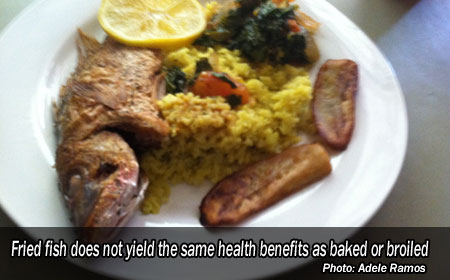BELIZE CITY—A study released by the University of Pittsburgh, School of Medicine, and publicized on Monday, August 4, 2014, highlights that nutrients in baked and broiled, but not fried, fish, improve brain health, and particularly improve the mass of the portion of the brain responsible for memory and cognition: the mental action or process of acquiring knowledge and understanding through thought, experience, and the senses.

The research, published in the American Journal of Preventive Medicine, concluded that eating baked or broiled fish once a week is good for the brain, regardless of how much omega-3 fatty acid it contains.
“Our study shows that people who ate a diet that included baked or broiled, but not fried, fish have larger brain volumes in regions associated with memory and cognition. We did not find a relationship between omega-3 levels and these brain changes, which surprised us a little. It led us to conclude that we were tapping into a more general set of lifestyle factors that were affecting brain health, of which diet is just one part,” said Senior investigator James T. Becker, Ph.D., professor of psychiatry, Pitt School of Medicine.
“People who ate baked or broiled fish at least once a week had greater grey matter brain volumes in areas of the brain responsible for memory (4.3 percent) and cognition (14 percent) and were more likely to have a college education than those who didn’t eat fish regularly, the researchers found,” a release from the University of Pittsburg said.
According to a release from the university, lead investigator Cyrus Raji, M.D., Ph.D., who now is in radiology residency training at UCLA, and the research team analyzed data from 260 people who provided information on their dietary intake, and who had high-resolution brain MRI scans. These individuals were cognitively normal at two time points during their participation in the Cardiovascular Health Study (CHS), a 10-year multicenter effort that began in 1989 to identify risk factors for heart disease in people over 65.
“The subset of CHS participants answered questionnaires about their eating habits, such as how much fish did they eat and how was it prepared,” Dr. Raji said. “Baked or broiled fish contains higher levels of omega-3s than fried fish because the fatty acids are destroyed in the high heat of frying, so we took that into consideration when we examined their brain scans.”
The release noted that the anti-oxidant effect of omega-3 fatty acids, which are found in high amounts in fish, seeds and nuts, and certain oils, also have been associated with improved health, particularly brain health.
Dr. Becker pointed to studies which have predicted that lifestyle changes, such as a reduction in rates of physical inactivity, smoking and obesity, could lead to fewer cases of Alzheimer’s disease and other conditions of cognitive impairment in the elderly.


